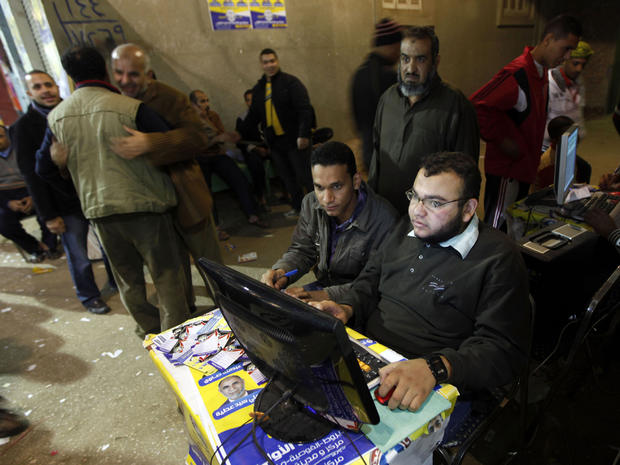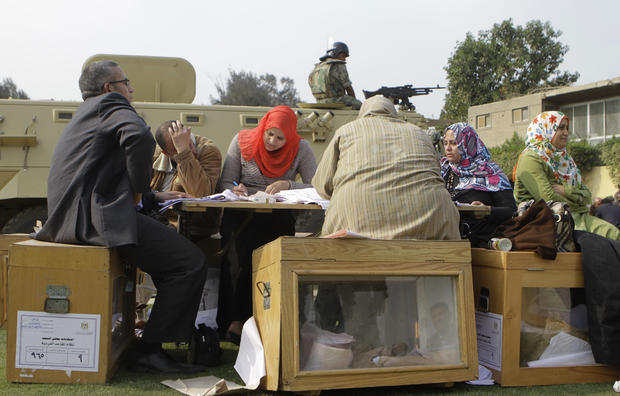Islamists likely to get majority rule in Egypt
CAIRO - Judges overseeing the vote count in Egypt's first parliamentary elections since Hosni Mubarak's ouster say near-final results show Islamist parities taking a majority of seats contested in the first round.
They say the Muslim Brotherhood could take 45 percent of the seats up for grabs. The liberal Egyptian bloc coalition and the ultra-fundamentalist Nour party are competing for second.
Together, Islamist parties would have a majority.
That said, the head of Egypt's election commission said the announcement of final results for first-round parliamentary elections has been delayed until Friday.
The commission previously said results from the two-day balloting would be announced late Thursday. But the state MENA news agency quotes Abdel-Mooaez Ibrahim as saying a large voter turnout has slowed down the counting process.
This week's vote was the first of six stages of parliamentary elections that will drag on until March.
Continued success by Islamists could allow them to give the country's government and constitution a more Islamist character.
The judges spoke on condition of anonymity because official results are expected to be released later Thursday.
The Brotherhood's strength at the polls is not necessarily testimony to widespread Egyptian support for its Islamist ideology. More crucial were two other major factors: the Brotherhood's history of helping the poor and a highly disciplined organization of activists, who on the two days of voting on Monday and Tuesday seemed to be everywhere.
Muslim Brotherhood capitalizes on Egypt vote
Egypt early results show Islamists lead in vote
Video: Millions turn out to cast votes in Egypt
Complete coverage: Anger in the Arab World
Outside polling stations around the country, Brotherhood activists were set up with laptop computers in booths, helping voters find their district and voter numbers -- which they wrote on cards advertising the party's candidates. Elsewhere, they posted activists outside to wave banners, pass out flyers or simply chat up voters waiting in line.
And in a marked change from previous elections, when Brotherhood members running as independents touted their Islamic credentials, this time their campaign focused on promises to improve services, to appeal to poor voters.
"Do you think any of these guys prays when it's not a holiday?" said Yasser Dawahi, pointing to four friends hanging out in his auto garage in the poor Cairo neighborhood of Zawiya al-Hamra before the vote. All said they'd vote for the Brotherhood.
"It's all about services, clean streets, jobs and hospitals. That's what's important," he said.
For decades, the Mubarak regime suppressed the Brotherhood, which was banned but still established a vast network of activists and charities offering free food and medical services. It transformed this into a potent campaign machine, holding rallies and wallpapering neighborhoods with banners for its Freedom and Justice Party. After voting closed in the Mediterranean coastal city of Alexandria on Tuesday night, Brothers even lined up to protect the road while ballot boxes were moved to the counting center.
During the voting, many parties violated a legal ban on campaigning during elections, but the Brotherhood's operation was by far the slickest and most widespread. The campaigning at the polls is particularly effective because so many parties are new and most Egyptians know almost nothing about them.
The election is likely to be the best indicator of Egyptians' political sentiments after decades of elections under Mubarak that were so rigged that few people even bothered to vote. The parliament it seats will play a role in determining if Egypt's new government remains secular or moves in a profoundly Islamist direction.
The Obama administration on Wednesday hailed the vote as Egypt's freest and fairest ever. This week's voting took place in nine of Egypt's 27 provinces, including the capital Cairo. In subsequent rounds, other provinces will take their turn in a process that will last till March.
Many criticized the Brotherhood's tactics in this election, though few deny they gave them an edge at the polls.
"They outspent, outworked and politically outclassed the other political parties by a huge factor," said Elijah Zarwan, a political analyst who specializes in Egypt.
The election commission has said it will punish groups that violate the election law. Foreign observers say it is too early to speak of systematic violations, though some add that the rules banning campaigning lack specificity. The U.S. National Democratic Institute, which ran an observer team, praised the vote in general in a statement Wednesday but advised authorities to set a 30-yard campaign-free zone around polling sites.
"They're not playing it fair," said Carmen George, a Coptic Christian who pointed to Brotherhood activists outside her polling station in the Cairo neighborhood of Nasr City.
"It's not guiding (voters). It's manipulating them," she said.
The Brotherhood operation in the neighborhood showed the blurriness of the line between campaigning and "assisting voters." Its activists sat behind a sign reading "Information" while female volunteers chatted up voters near the entrance.
None wore party logos, leading some voters to think they were from the state election commission.
While most voters merely needed help getting their numbers, one volunteer told an undecided voter to choose the scale, the soccer goal and the crocodile -- the campaign symbols of the party and its two local candidates. The symbols, on campaign literature and the ballot, are to help illiterate people recognize their choices.
Nearby, Brotherhood volunteer Siham Sobhi wore a badge reading "information committee."
"I ask people who they want to vote for and if they say they don't know, I tell them I am with Freedom and Justice," she said. "I don't tell them how to vote, but I describe my position."
She denied this constitutes campaigning.
A moment later, 70-year-old Sayida Mohammed walked from the volunteer's table to the polling station.
"I want someone to fix the country because the people who are full don't feel for people who are hungry," she said.
She was unclear which party she supported but knew which symbols to pick: The scale, the soccer goal and the crocodile.


